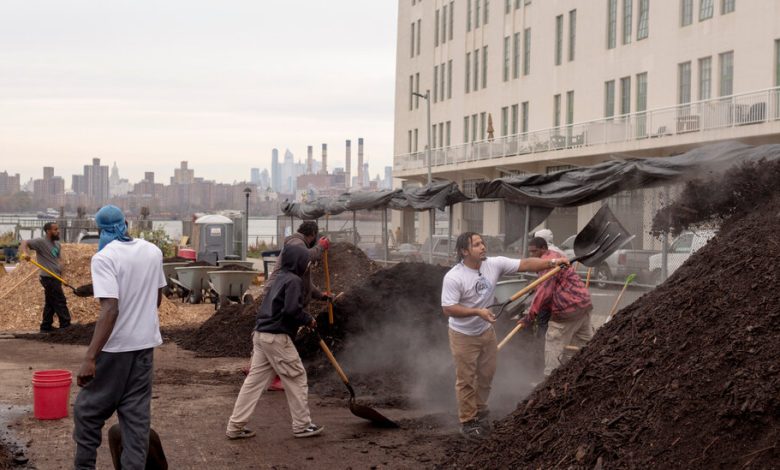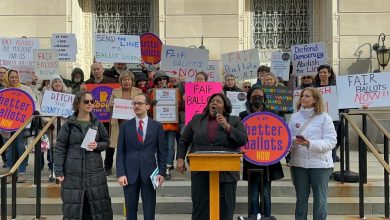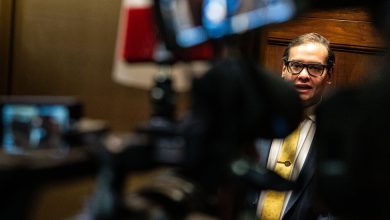What Endures After a Climate Activist’s Suicide: Grief, Anger and Hope

They were walking up Ninth Street in Park Slope as they often did after work, each man a movie unto himself: one a crusading L.G.B.T.Q. rights attorney who quit the law to shovel dirt, the other a young man from the projects who became his most brilliant protégé.
David Buckel and Domingo Morales were professional composters, idealistic and maybe a little extremist. On their evening walks, the two often talked about the harm that even people in the composting world were doing to the planet. Several times a month, Mr. Morales said, “David and I went home feeling dark.”
That night, Mr. Buckel told his younger friend about Tibetan monks who had set themselves on fire to protest China’s occupation of their land.
“He was excited when he talked about it,” Mr. Morales said recently. “He said, ‘Don’t you think it’s honorable?’ I said, ‘No, it’s stupid.’ I said, ‘David, why are you telling me about this?’”
They were two men who had found meaning in composting, but also the fatalism that vexes many in the environmental movement, the knowledge that the work they do is never enough. As they walked together that night — Mr. Morales before heading home to East Harlem, Mr. Buckel before returning to his husband in brownstone Brooklyn — their lives were heading in very different directions.
On April 14, 2018, about a year after their discussion about the Tibetan monks, Mr. Buckel texted the younger man to say he was not coming to the compost site that morning. Then he sent a lengthy email to associates and the media, and went into Prospect Park.
Mr. Morales did not read the email right away. He was used to long emails from his mentor, often grim reports of environmental catastrophes.
“I thought, Oh, God, another article,” Mr. Morales said. “So I skimmed.”
A bit later, Mr. Morales returned to the email. There was a reference to self-immolation. Why would David send such a depressing email so early in the morning? “I was a little aggravated,” Mr. Morales said.
Then it hit him. Mr. Buckel was writing in the first person. Mr. Morales showed the email to another worker at the composting site: Does this say what I think it does? By that time, emergency response teams near Prospect Park had already received the 911 call: man on fire.
Mr. Buckel’s death by self-immolation, along with his suicide note, sent a clear call to action, urging others to take up the fight that he was leaving. “My early death by fossil fuel reflects what we are doing to ourselves,” he wrote. “Here is a hope that giving a life might bring some attention to the need for expanded action, and help others give a voice to our home, and Earth is heard.”
He was 60 years old.
Five years after his death, those closest to him are left with grief and the bitter taste of a life sacrificed unnecessarily. Some are angry that he could have hurt so many people, or are troubled by the anguish he must have suffered. Friends and loved ones — including people who shared his commitment to environmental causes — are wrestling with what his death meant, and the impact it had on the movement he left behind.

After some time working on L.G.B.T.Q. issues as a lawyer, Mr. Buckel felt pulled toward climate concerns.Credit…Jeff Zelevansky/Reuters
What Makes a Life Matter?
David Buckel grew up in an agrarian family in Batavia, N.Y., and began his post-college career as a home health aide. When he found the law, it energized him. He worked first at Legal Services, as an advocate for poor clients, then later joined Lambda Legal, where he took on national cases for gay and trans rights, including a negligence suit against a Nebraska county in the rape and murder of Brandon Teena, a transgender man who inspired the film “Boys Don’t Cry.”
A constant in his life was his relationship and then marriage to Terry Kaelber, who runs a nonprofit organization for older adults. The couple moved to Brooklyn and, together with a lesbian couple in the neighborhood, raised a daughter.
“It was right away clear to me that for David, the most important thing was to make sure that the world would be better off for his having been alive,” Mr. Kaelber said.
Over time, Mr. Buckel felt pulled toward environmental concerns, which he saw as existential threats to the planet. He also wanted to be outdoors. At a rudimentary compost site near the waterfront in Red Hook, Brooklyn, in 2008, he found outdoor work that reduced the production of methane, which traps far more heat in the atmosphere than carbon dioxide — a tangible response to climate change.
He expanded the site into one of the biggest in the country that did not use fossil fuels, relying wholly on human labor, solar and wind. He also mentored young people who were often new to composting or environmental work.
Among his apprentices was Domingo Morales.
On a recent afternoon at the sprawling Patterson Houses in the South Bronx, Mr. Morales, 31, supervised two younger men shoveling a mound of dirt and food scraps from one part of a lot to another, to allow air into the decomposing materials.
The compost site is one of nine that Mr. Morales has started since Mr. Buckel’s death, eight of them at public housing projects. At most of them, the soil from the composting is used to grow fresh produce for the residents.
“Domingo’s gone on to do a lot of what David would’ve liked to have done,” Mr. Kaelber said. “That’s the biggest legacy of David: that he saw the promise in Domingo, and they became very close.”
Mr. Morales’s early years were as chaotic as Mr. Buckel’s were driven. He grew up in public housing — including the Patterson Houses — and spent time in foster care, and had two children by the time he was 18. More than once, he said, he came close to suicide. In 2015 he was at a low point, drinking a lot and frustrated with life, when he saw a flyer for an AmeriCorps program called Green City Force, which hires and trains residents of public housing for green jobs.
He was 23.
“Green City Force saved my life,” he said, recounting a story that he has told before. “I probably would’ve gone to the roof if I hadn’t seen that flyer.”
The program took him to the compost site in Red Hook. He gravitated to Mr. Buckel right away.
“He was almost otherworldly, with an alien kind of energy,” Mr. Morales said. “I’ve never met anyone with that kind of energy. I thought, Wow, this guy really cares about composting. I don’t get it. Tell me more.”
Different Temperaments
Mr. Buckel was a demanding boss, insisting not only that all work be done manually but also that it be done a certain way. He did not allow music or profanity on the site, and expected that the workers carry themselves as professionals. It was the same absolutism that had fueled his legal work, Mr. Kaelber said.
“The things he was committed to, he was fully committed to,” Mr. Kaelber said. “And it made it hard sometimes for other people to work with him, because he had such a high standard.”
But for Mr. Morales, Mr. Buckel’s rigorous discipline clicked. He was also impressed to see a lawyer shoveling dirt.
“I thought, This guy’s a lawyer, but he’s composting?” Mr. Morales said. “But he’s rich. Why does he have to compost? I don’t get it. But I was curious. He enticed me.”
He took to the work enthusiastically, volunteering on his days off. He, too, became uncompromising in what he considered the right way to compost, and dismissive of anyone who used machinery to handle more volume.
“These are the kinds of things that David and I struggled with,” Mr. Morales said: “People who are part-time advocates for the planet.”
For all their common purpose, Mr. Buckel and Mr. Morales had different temperaments. Mr. Buckel thrived on figuring out better systems for doing things. Mr. Morales was more sociable, and liked joking and bringing people together. “All that community work would exhaust David,” Mr. Kaelber said.
Mr. Buckel regularly feuded with the Sanitation Department, which funded the site, and with other agencies that had a hand in it. “David took it all personal,” Mr. Morales said.
Composting by hand is grueling work. Mounds of dirt and food scraps, known as windrows, sometimes taller than the people working them, need to be turned over by shovel every seven days for months, even in bad weather. Mr. Buckel, who was nearing 60, went home in pain most nights. Eventually, he had to cut back on the physical labor and focus more on administrative work.
“He was struggling with the idea that he couldn’t carry his own weight,” Mr. Kaelber said, speaking in hindsight — at home, Mr. Buckel had hidden his physical and emotional pain. “I think he struggled with what to do in his old age. It was hard for him to even imagine, could he be as physical?”
Mr. Kaelber, 71, who runs the Institute for Empowered Aging at the United Neighborhood Houses of New York, has made a career of helping people see value in old age, and he can be evangelical on the subject. Yet in his own home, his husband could not see value in his coming years.
“I think he lost his way at the end because he couldn’t figure out where he could work next,” Mr. Kaelber said. “If he couldn’t be doing something to make the world a better place, it was time for him to go.”
As Mr. Buckel was pulling back, Mr. Morales was growing on the job and eager to replicate their Red Hook work in other neighborhoods. But Mr. Buckel dismissed his ideas as unrealistic. It was so much work just to keep the Red Hook site funded and operational.
“He was checked out, and I was just arriving,” Mr. Morales said. “I had such a grand vision, and he put a needle in that balloon.”
And always, Mr. Buckel faced the math common to climate activists: Whatever successes they had, whatever progress they made, the planet was still getting hotter and less habitable.
Mr. Morales tends to smile through the somber parts of his conversation, perhaps a product of his childhood, when he learned to deflect pain with humor. Throughout several long conversations, he always used the same phrase — “When he did what he did” — to refer to Mr. Buckel’s suicide.
“When he did what he did, it kind of broke me for a while,” he said. “Because I’m like, Did he not believe in what we were doing? Because there were times when I didn’t believe, and I felt backed against a wall. If we’re doing everything right, and we’re reducing methane, and we’re teaching people, and everybody else isn’t doing it, what’s the point?”
“Climate Despair”
After Mr. Buckel’s death, Mr. Morales struggled to maintain the Red Hook compost site amid budget cuts. Finally, after the city suspended its curbside compost program and defunded the site during the pandemic, he was laid off in June 2020.
But through a supervisor at Green City Force, he applied for and won a grant called the David Prize, created by the real estate developer David Walentas and given annually to five New Yorkers with “ideas for extraordinary change.” Mr. Morales’s proposal was to create compost sites at public housing projects around the city. The grant gave him $200,000 to start. He called his organization Compost Power.
He credited his mentor. “David’s vision was me having a vision,” he said. “He couldn’t do it for himself.”
But if Mr. Buckel’s true legacy is Mr. Morales, it is the legacy of his life, not his grisly death.
Mental health professionals who work with climate activists talk about the risk of climate despair: a sense that whatever they do can never offset the much bigger forces destroying the environment. They also stress that the reasons for suicide are rarely simple, and hard to know in full.
In 2022, the year Hurricane Ian devastated Florida and wildfires and drought plagued the West, another climate activist, Wynn Bruce, set himself on fire in front of the United States Supreme Court Building on Earth Day, prompting worries about “doomerism” in the movement.
“Anyone involved in this problem feels a very strong sense of frustration and anger, futility,” said Susan Clayton, a professor of psychology at the College of Wooster in Ohio. “There’s that sense that the stakes are so high, and there can be extreme pessimism that we’re not doing anything, or if we are doing something it’s not going to be enough.”
Also, many activists feel resented for their message, which can lead to a sense of isolation, said Patricia H. Hasbach, a psychologist and educator in Eugene, Ore.
Dr. Clayton stressed that Mr. Buckel’s level of despair is rare, adding: “We want this to be seen as not a logical course of action for someone who is concerned about the planet.”
On an afternoon this September, Mr. Kaelber walked past the meadow where Mr. Buckel died, now marked by a cluster of trees and a small sign designating David’s Grove. For Mr. Kaelber, who has now lived more than five years without his husband, the main legacy of Mr. Buckel’s action has been grief, which has changed over time, he said, but not gone away.
“I think most of the people who were close to me and David were really angry that he did this,” Mr. Kaelber said. “A lot of people feel, How can you do this and hurt so many people?”
He walked a while, toward an overgrown section of the park called the Vale of Cashmere.
“I’ve always felt that what he did was such a waste,” Mr. Kaelber said. “It was like a flash in the pan, famous for 15 minutes.”
He reflected on Mr. Bruce’s self-immolation outside the Supreme Court, four years after Mr. Buckel’s. “I often feel as if, wouldn’t it have been more impactful for him to reach out to friends in the community to say, let’s chain ourselves around here, and let’s keep doing it and doing it and doing it?”
The Next Army
Miles from Prospect Park, at a Compost Power site in Williamsburg, Brooklyn, Mr. Morales directed seven workers moving a windrow from one section of a concrete lot to another. He was all infectious energy, making sure everyone was engaged.
Mr. Morales said he is careful about how he talks to his young staff, constantly telling them that he appreciates the work they do. Occasionally one will ask about Mr. Buckel.
When he tells them that Mr. Buckel set himself on fire to shock people and change the system, he said, they sometimes ask if Mr. Buckel is still alive.
“It’s hard to talk about because you don’t want to glorify,” Mr. Morales said. “He’s a person that I deeply respected and loved as a friend, a mentor, and he took his own life. It’s hard for me to talk about. It’s always a dark thing.
“I also try to tell them how they are making a difference. I don’t want them to go into a whole thing at night like David and I used to do, like, look for articles or YouTube videos that are going to depress them.”
But in private, he said, he often struggles. Is he really making a difference?
“Doing this work, I’m constantly in that dark place,” he said. “There are so many contradictions to being sustainable that it’s hard not to feel that anxiety: Would it be better if I were not on this planet producing a carbon footprint?”
What keeps him up at night: eco events that hand out plastic water bottles; compost sites that produce harmful runoff but look great in their Instagram feeds; his own dependence on fossil fuels to carry equipment. “Whenever I drive, I’m like, there goes two days of my work,” he said.
And he thinks often of Mr. Buckel — of his life and his death. “What made him think that that was going to make a big impact on people who are skeptical?” he said. “That’s what angers me. He was such a logical, strategic person. How could you be OK with that big question mark at the end?
“I know we need him now and we don’t have him.”
The work is Sisyphean: Move the pile from one spot this week, then go through the whole process again a week later.
Mr. Morales gathered the staff in a circle to test their composting knowledge. They were all young people of color, from different housing projects, and several said they had thought of composting as a white thing before meeting Mr. Morales. All are paid through Green City Force, from $22 to $25 an hour.
There was no odor or sign of rats, which often plague composting sites.
“What are the three stages of composting?” Mr. Morales asked.
A few voices answered. “Mesophilic, thermophilic, maturation.”
Water vapor rose from several of the compost mounds, caused by the heat produced as the organic material decomposed. Thermometers on the mounds read up to 160 degrees. In the background were the waterfront and a newish luxury apartment building.
“What is the F.B.I. of a compost site?”
“Fungus, bacteria and insects.”
Mr. Morales smiled. “That’s the army that we’re creating,” he said.
If you are having thoughts of suicide, call or text 988 to reach the 988 Suicide and Crisis Lifeline or go to SpeakingOfSuicide.com/resources for a list of additional resources.





